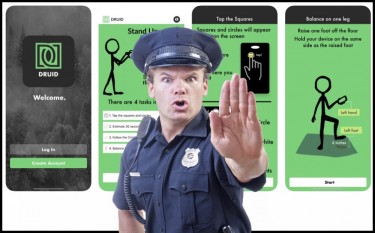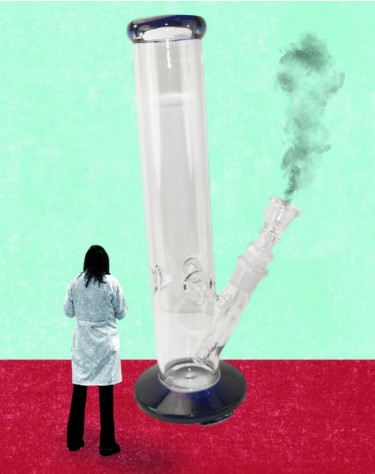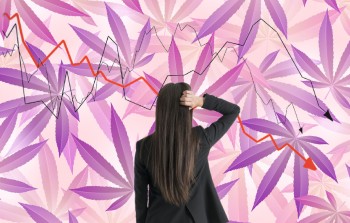Does Your Phone Know That You’re High?

Some researchers believe that they have managed to figure out a way to use your smartphone to detect if you are impaired by cannabis or not. While according to the preliminary study they have managed to detect impairment 90% of the time by using “time features” and “phone sensors” in tandem.
Here’s the Methodology used by the researchers with a direct link to the study as well;
Young adults (ages 18–25) in Pittsburgh, PA, who reported cannabis use at least twice per week, completed up to 30 days of daily data collection: phone surveys (3 times/day), self-initiated reports of cannabis use (start/stop time, subjective cannabis intoxication rating: 0–10, 10 = very high), and continuous phone sensor data. We tested multiple models with Light Gradient Boosting Machine (LGBM) in distinguishing “not intoxicated” (rating = 0) vs subjective cannabis “low-intoxication” (rating = 1–3) vs “moderate-intensive intoxication” (rating = 4–10). We tested the importance of time features (i.e., day of the week, time of day) relative to smartphone sensor data only on model performance, since time features alone might predict “routines” in cannabis intoxication. - SOURCE
In other words, the test was conducted combining cellphone data such as accelerometers and GPS, and then cross-referenced this with the self-reported data from the surveys that participants filled out. This allowed their algorithmic approach to narrow down “periods of intoxication” more accurately.
However, how this would work in the real world is difficult to say. It’s not like consumers are going to be sitting down and taking surveys after every time they smoke. However, the test data might provide some insights into average consumption time/dates to be able to detect “higher frequencies of impairment”.
Of course, this technology is the current Holy Grail for both cannabis activists and law enforcement seeing that once cannabis is legalized on a federal level – merely detecting THC will no longer be protocol for intoxication. Apps like DRUID are working on this already.
This is because THC can stay in your system for up to 90-days.
Issues with the study
While researchers claim that they were able to identify impairment 90% of the time, the study was done within a controlled environment. As mentioned, people will not self report their cannabis consumption to an app that will quantify whether they are high or not.
This is even more true when you hear some quotes from the researchers like this one;
“Using the sensors in a person’s phone, we might be able to detect when a person might be experiencing cannabis intoxication and deliver a brief intervention when and where it might have the most impact to reduce cannabis-related harm,” Tammy Chung, Professor of Psychiatry, Rutgers Institute for Health.
As you can see, the authors are using this more as a harm reduction tool – which means that it could work for people who are thinking of stopping their cannabis use, but would not work for detecting if someone is impaired while driving.
It seems, that this tool is more about mapping out “habitual users patterns” which will allow them to intervene whenever there is a trigger to consume cannabis. In this scenario, it is far more likely that participants report when they are smoking cannabis, especially if it is part of the protocol.
For example, if someone believes they have a “problem” with cannabis consumption, this tool can be used to track their behavioral patterns which would allow harm reduction specialists the ability to plan for when someone is most susceptible to relapse.
As a tool for helping someone overcome compulsive behavior – this may indeed be something that could work.
However, within the real world – the practical applications for judging impairment seems to not exist. Nonetheless, the main intention of the study was to show that it “could be done” as summarized by the following quote;
“This proof-of-concept study indicates the feasibility of using phone sensors to detect subjective cannabis intoxication in the natural environment, with potential implications for triggering just-in-time interventions,” the study’s authors concluded.
Using Smartphones for addiction
While this study was focused on detecting cannabis impairment, the application of this technology could serve the wider harm reduction objective. Addiction is a compulsory action, meaning that there are several neural networks closely intertwined firing off at the same time.
You’ll typically find that when someone is addicted to a specific substance, there are “co-addictions” they also manifest. For example, someone who is an avid smoker might also be an avid video game player. Whenever they engage with one of the activities – they trigger the other one and together they create a feedback loop.
This compulsory behavior can be quantified using your smartphone and as the researchers of this study pointed out, can be up to 90% accurate if you have willing participants.
In fact, being able to map out compulsion in a real world scenario could drastically improve harm reduction efficacy by being able to plan accordingly.
Imagine a world where someone comes to you and says, “I would really like to give up X-addiction”. Unless critical action is required, as in – if a patient continues consuming they will cause imminent death, then direct immediate action is taken to help the patient kick their habit.
However, if the addiction isn’t life threatening, telling the patient to simply continue with life as they normally would for a period of 30 days and to simply write down when they consume and the conditions that triggered the desire – over a period of a month you can have a decent map of addiction.
It just makes sense that with this data, you’d be able to more effectively plan a recovery path that avoids major triggers while initiating pre-emptive action to minimize relapse.
I personally don’t like the industry of rehabilitation, in many cases they are merely money mills. However, I do think that if we could use technology – that is currently being used against us by creating psychometric digital avatars based on our behavior – and use it for our personal development; we could make some significant changes real quickly.
This is also not the first time that this has been attempted and one of these days we will have a device that can detect how impaired someone is by merely scanning their vitals and testing their response time.
What’s your take on this? I’d love to read about it in the comments!
SMART PHONE APPS FOR BEING HIGH, READ MORE..
CAN THE DRUID APP GET YOU OUT OF A DUI CHARGE, WE ASKED!
OR..
HOW A CHEMIST SOLVED THE MARIJUANA BREATHALYZER PROBLEM.







